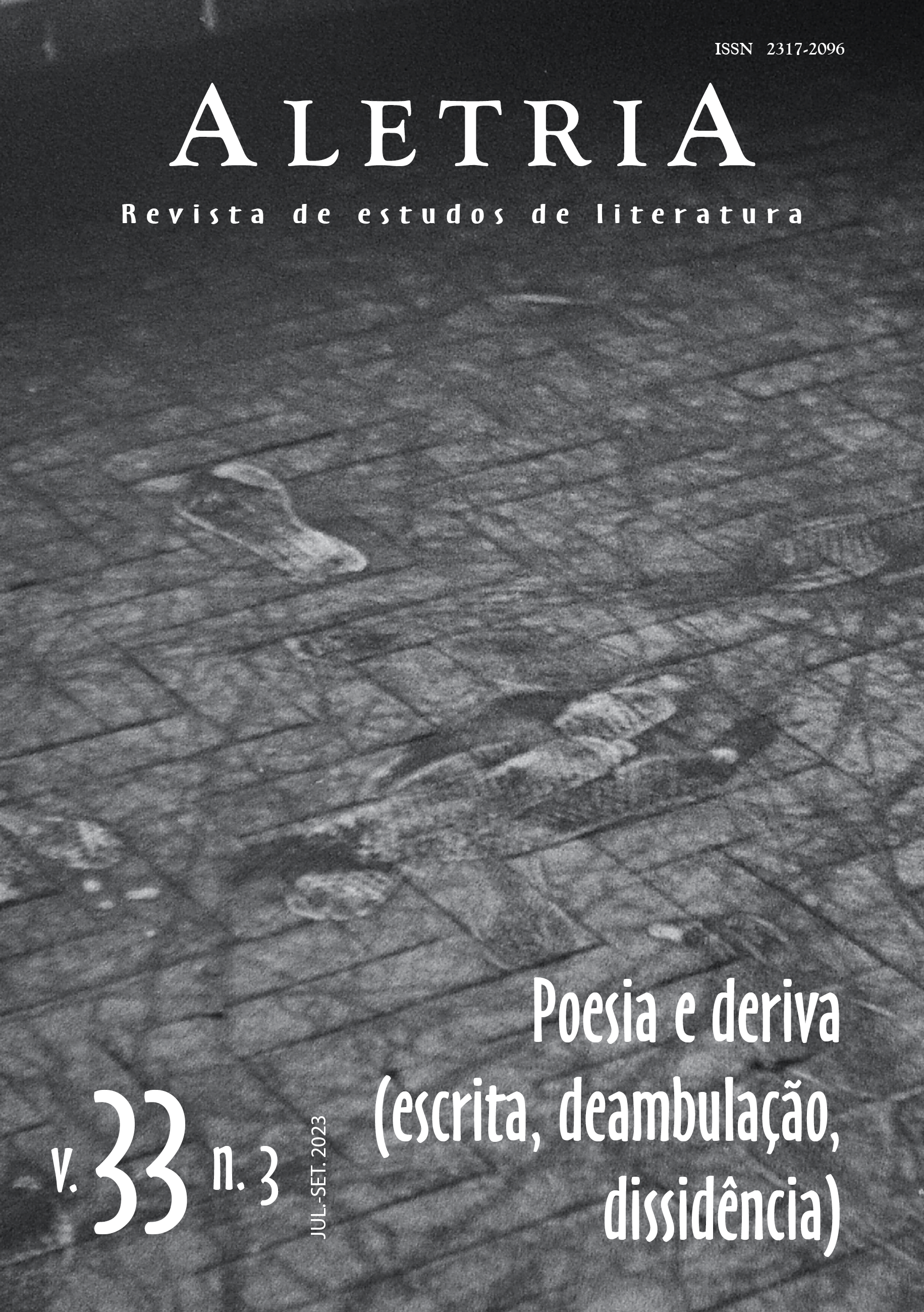From orature to oralitura
The crossing of the word in the adventures of the letter
Keywords:
Orature, Oralitura, Literary writing, José Craveirinha, Mozambican LiteratureAbstract
The article discusses the contruction process of the Mozambican poet José Craveirinha’s literary writing as a poetic expression and reference to traditional culture, showing how it displaces the opposition between written and spoken. Taking as reference the notions of poetics of relationship, by Edouard Glissant (2013), sharing of the sensitive, by Jacques Rancière (2005) and oralitura, by Leda Maria Martins (1997), among others, the study explores how Craveirinha’s poetry is enunciated from a critical point of view on poetic making, that highlights the close connection between writing and oral textuality in Mozambican literary production.
Downloads
References
ABDALA JUNIOR, Benjamin. Literatura, história e política: literaturas de língua portuguesa no século XX. São Paulo: Ática, 1989.
ANDRADE, Mário Pinto de. Origens do nacionalismo africano. Lisboa: D. Quixote, 1997.
AYOH’OMIDIRE, Félix. Yorubanidade mundializada: o reinado da oralitura em textos yorubá-nigerianos e afro-baianos contemporâneos. Tese de Doutorado. Instituto de Letras (Programa de Pós-graduação em Letras e Linguística) – Universidade Federal da Bahia, Salvador, 2005.
BAKHTIN, Mikhail. Problemas da poética de Dostoiévski. 2 ed. rev. Rio de Janeiro: Forense Universitária, 1997.
BENVENISTE, Émile. Da subjetividade na linguagem. In: BENVENISTE, Émile. Problemas de linguística geral I. Tradução de Maria da Glória Novak e Maria Luiza Neri. Campinas, SP: Pontes/Editora da Universidade Estadual de Campinas, 1988.
CABAÇO, José Luís. A questão da diferença na literatura moçambicana. Via Atlântica, [S. l.], v. 5, n. 1, p. 61-69, 2004. DOI: 10.11606/va.v0i7.49786. Disponível em: https://www.revistas.usp.br/viaatlantica/article/view/49786. Acesso em: 30 jul. 2021.
CABAÇO, José Luís. Moçambique: identidade, colonialismo e libertação. São Paulo, Editora UNESP, 2009.
CANDIDO, Antonio. Formação da literatura brasileira: momentos decisivos. Belo Horizonte: Itatiaia, 1993.
CHAVES, Rita. A formação do romance angolano: entre intenções e gestos. São Paulo: FBLP, 1999.
CHAVES, Rita. José Craveirinha: a poesia em liberdade. In: CHAVES, Rita. Angola e Moçambique: experiência colonial e territórios literários. São Paulo: Ateliê Editorial, 2005.
CRAVEIRINHA, José. Karingana ua Karingana. 3 ed. Maputo, Minerva Central, ASDI e Instituto Camões, s.d. [1995], p. 3.
DERIVE, Jean. Literalização da oralidade, oralização da literatura nas culturas africanas. Trad. Neide Freitas. In: QUEIROZ, Sônia (org.). Oralidade, literalização e oralização da literatura. Cadernos Viva Voz. Belo Horizonte: FALE/UFMG, 2010, p. 117-129.
GLISSANT, Édouard. Le discours antillais. Paris: Galimard, 1980.
GLISSANT, Édouard. Introdução a uma poética da diversidade. Trad. Enilce do Carmo Albergaria Rocha. Juiz de Fora: Editora UFJF, 2013.
MARTINS, Leda Maria. Afrografias da memória. São Paulo: Perspectiva; Belo Horizonte: Mazza Edições, 1997.
MATA, Inocência. A alquimia da língua portuguesa nos portos da expansão em Moçambique, com Mia Couto. Scripta, Belo Horizonte, v. 1, n. 2, p. 262-268, 27 mar. 1998.
MATA, Inocência. No fluxo da resistência: a literatura, (ainda) universo da reinvenção da diferença. Gragoatá, Niterói, n. 27, p. 11031, 30 dez. 2009.
MATA, Inocência. Gêneros narrativos nas literaturas africanas em português – entre a tradição africana e o “cânone ocidental”. Scripta, Belo Horizonte, v. 19, n. 37, p. 79-94, 2º sem. 2015.
NUNES, Susana Dolores Machado. A milenar arte da oratura angolana e moçambicana: aspectos estruturais e receptividade dos alunos portugueses ao conto africano. Porto: Centro de Estudos Africanos da Universidade do Porto, 2009.
ORTIZ, Graciela. Comentários. In: GLISSANT; Edouard. O mesmo e o diverso. Antologia de textos fundadores do comparatismo literário interamericano. Disponível em: http://www.ufrgs.br/cdrom/glissant/comentarios.htm. Acesso em: 31 ago. 2021.
PADILHA, Laura Cavalcante. Entre voz e letra: o lugar da ancestralidade na ficção angolana do século XX. 2 ed. Niterói: EdUFF; Rio de Janeiro: Pallas Editora, (1995) 2007.
PERRONE-MOISÉS, Leyla. A literatura como mediação. Anais do VIII Congresso Internacional da ABRALIC. Belo Horizonte, ABRALIC, 2002, CD-ROM.
RANCIÈRE, Jacques. Políticas da escrita. Trad. Raquel Ramalhete et al. Rio de Janeiro: Editora 34, 1995.
RANCIÈRE, Jacques. A partilha do sensível: estética e política. Trad. Mônica Costa Netto. São Paulo: EXO experimental org.; Editora 34, 2005.
ROSÁRIO, Lourenço Joaquim da Costa. A narrativa africana de expressão oral: (Transcrita em português). Lisboa: Instituto de Cultura e Língua Portuguesa, Angola: Angolê-Artes e Letras, 1989.
SCHIPPER, Mineke. Literatura oral e oralidade escrita. In: QUEIROZ, Sônia (org). A tradição oral. Cadernos Viva Voz. Belo Horizonte: FALE/UFMG, 2006, p. 10-24.
SILVA, Rejane Vecchia Rocha e; SOUZA, Ubiratã Roberto Bueno de. Literatura moçambicana e oralidade: uma postura crítica e uma fundamentação teórica. Scripta, Belo Horizonte, v. 19, n. 37, p. 95-117, 2º sem. 2015.
ZUMTHOR, Paul. A letra e a voz: a “literatura” medieval. Trad. Amálio Pinheiro e Jerusa Pires Ferrei-ra. São Paulo: Companhia das Letras, 1993.
Downloads
Published
How to Cite
Issue
Section
License
Copyright (c) 2023 Terezinha Taborda Moreira (Autor)

This work is licensed under a Creative Commons Attribution 4.0 International License.
Authors who publish with this journal agree to the following terms:Authors retain copyright and grant the journal right of first publication with the work simultaneously licensed under a Creative Commons Attribution Non-Commercial No Derivatives License that allows others to share the work with an acknowledgement of the work's authorship and initial publication in this journal.Authors are able to enter into separate, additional contractual arrangements for the non-exclusive distribution of the journal's published version of the work (e.g., post it to an institutional repository or publish it in a book), with an acknowledgement of its initial publication in this journal.Authors are permitted and encouraged to post their work online (e.g., in institutional repositories or on their website) prior to and during the submission process, as it can lead to productive exchanges, as well as earlier and greater citation of published work (See The Effect of Open Access).





